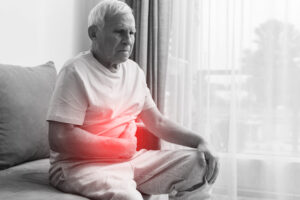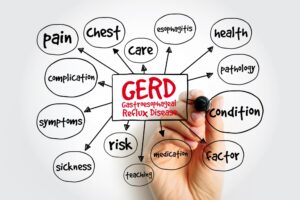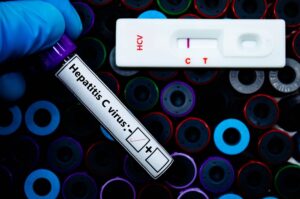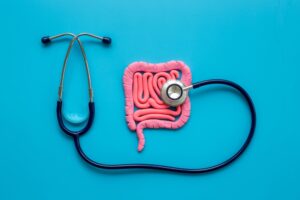
Signs of Stomach Ulcers
Stomach ulcers are open sores that develop on the lining of the stomach or small intestine, but heartburn is caused when stomach acid flows back into the esophagus.

Acid reflux occurs when acid from the stomach flows back up into the esophagus, causing a burning sensation in the chest and throat. When Acid reflux in adults is left untreated, it can lead to gastrointestinal disorders such as Barrett’s esophagus and esophagitis which are more serious. That’s why it’s advisable to treat it as soon as you notice it. The good news is that there are several effective treatment options available that can help you find relief. Here are some effective ways you can get rid of acid reflux in adults.
There are several nonprescription medications you can get over the counter to help you neutralize, reduce and block acid production. Here’s what you can grab from the chemist’s store:
Antacids work by neutralizing the hydrochloric acid in the stomach. This helps to reduce the symptoms of acid reflux in adults and other conditions caused by excess stomach acids, such as stomach ulcers and stomach lining inflammation. Antacids come in various forms, including tablets, liquids, and chewable tablets. Some common examples of antacids include Tums, Rolaids, and Pepto-Bismol. Note that antacids can provide fast relief from acid reflux symptoms, but they do not treat the underlying cause of the condition.
There are medications that can help increase the muscle contractions in the lower esophagus, helping the body to empty the stomach more quickly and reduce acid reflux.
Examples of such medicine include esomeprazole (Nexium), omeprazole (Prilosec), lansoprazole (Prevacid, and others) and pantoprazole (Prontonix).
There are medications that can help block acid production and heal the esophagus. They are known as proton pump inhibitors, and they can reduce the burning sensation in your chest.
Examples of such medication include omeprazole (Prilosec OTC), lansoprazole (Prevacid 24 HR), and esomeprazole (Nexium 24 HR).
If you don’t want to take non-prescribed medicine, you can opt to visit your doctor and get prescribed medication. There are two medications you can get in this case, and they include the following:
Proton pump inhibitors (PPIs) are a class of medications that work by reducing the amount of acid produced by the stomach. This means they can help treat acid reflux.
Prescription-strength PPIs are only available by prescription and are typically more potent than over-the-counter PPIs.
Examples of prescription-strength PPIs include omeprazole, rabeprazole, lansoprazole, pantoprazole, dexlansoprazole, and esomeprazole.
These medications can also be used to treat other conditions, such as peptic ulcers and erosive esophagitis.
Prescription-strength PPIs are generally considered safe when used as directed, but long-term use may be associated with certain risks, such as headaches, nausea, and diarrhea.
H-2 blockers, AKA histamine H2-receptor antagonists, are a class of medications that work by blocking the action of histamine in the stomach, hence reducing the amount of acid produced.
Some examples of prescription-strength H-2 blockers your doctor can suggest include cimetidine, nizatidine, ranitidine, and famotidine.
Just like Proton pump inhibitors (PPIs), prescription-strength H-2 blockers can also be used to treat conditions such as peptic ulcers and erosive esophagitis. They can also be used to prevent stress ulcers and to treat Zollinger-Ellison syndrome.
The side effects of H-2 blockers are usually minor, and they can include constipation, fatigue, headache, drowsiness, diarrhea, and muscle ache.
Note that it’s advisable to only use these medications as directed by a healthcare provider. This way, you’ll be able to limit unnecessary side effects.
While acid reflux in adults can be controlled by medication, sometimes, medication might not help. Or you might also not be ready to take medication for the long-term, and so you decide to take the other route; doing surgery.
There are three surgeries you can opt for. These include the following:
During fundoplication, the surgeon wraps the top part of your stomach (the fundus) around the lower-end esophageal sphincter to tighten the muscle and create a barrier that prevents acid from flowing back into the esophagus.
There are two ways your surgeon can do a fundoplication. The two methods include:
The recovery time after a fundoplication surgery is usually around a few weeks. Patients are usually able to return to their normal activities within a few weeks.
A LINX device is a small, magnetic ring-shaped device that is surgically implanted around the lower end of the esophagus.
The device is designed to open and close in response to the natural swallowing process. For example, when you’re swallowing, the beads pull together and create a barrier that prevents stomach acid from flowing back into the esophagus. However, when you’re not swallowing, the beads relax and allow food and liquid to pass through the esophagus into the stomach.
TIF involves creating a new valve between the stomach and esophagus to prevent acid reflux. It’s similar to traditional fundoplication surgery, only that it’s performed through the mouth with the help of an endoscope (without any incisions on the skin).
A plus for this procedure is that it’s faster to recover from it. You can go home the same or the following day and even resume normal activities within a few days.
You no longer need to suffer from acid reflux. There are many treatments you can take to help you relieve the burning sensation, from non-prescribed medications to prescribed meds to different types of surgeries.
At Allied Digestive Health, we have the expertise needed to help you get rid of acid reflux in adults. We offer comprehensive and quality care treatment to all our patients. Our physicians are board-certified in gastroenterology and hepatology, so you can expect nothing but the best care possible. We understand how uncomfortable and disruptive acid reflux in adults can be, and we’re here to help you find relief. Contact us today and book an appointment with us.

Stomach ulcers are open sores that develop on the lining of the stomach or small intestine, but heartburn is caused when stomach acid flows back into the esophagus.

Poorly absorbed carbs may ferment in the gut, leading to symptoms such as bloating, gas, diarrhea, or constipation.

If left untreated, GERD can lead to complications including esophagitis (inflammation of the esophagus), strictures (narrowing of the esophagus), or even Barrett’s esophagus, a condition that increases the risk of esophageal cancer.

IBS-C often requires a tailored approach that incorporates dietary changes, stress management, and sometimes prescribed medications to regulate bowel movements and reduce discomfort.

Hepatitis C can affect women differently due to hormonal variations, immune system responses, and unique physiological factors

This connection means that stress, anxiety, and other psychological factors can directly impact gut function, leading to symptoms like abdominal pain, bloating, and irregular bowel movements.

Chronic inflammation associated with IBD can lead to complications such as joint pain, skin conditions, eye issues, and more.

How different types of fiber affect IBS is crucial to creating a diet that supports digestive health without triggering flare-ups.

Lactose Intolerance occurs due to a deficiency of lactase, the enzyme responsible for digesting lactose in the small intestine.

This condition can result from various factors, including poor diet, stress, infections, or underlying health conditions like IBD.

One of the most essential steps in managing IBS is identifying specific triggers and paying attention to your body’s unique responses.

Although the symptoms of IBS can vary widely from person to person, several common signs are associated with the condition.
For Your Visit
Brick Office
P: 732-458-8300
Brick Medical Arts Building
1640 Route 88, Suite 202
Brick, New Jersey 08724
Mon – Fri: 8:30AM – 5:00PM
Sat & Sun: Closed
Neptune Office
P: 732-776-9300
Jersey Shore Medical Arts Building
1944 Corlies Ave. Suite 205
Neptune, New Jersey 07753
Mon – Fri: 8:30AM – 5:00PM
Sat & Sun: Closed
Jackson Office
P: 732-928-2300
706 Bennetts Mills Road
Jackson, New Jersey 08527
Mon – Fri: 8:30AM – 5:00PM
Sat & Sun: Closed
© All Rights Reserved